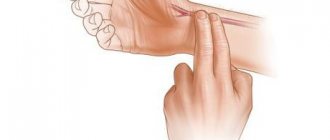We are used to explaining sudden and unexpected dizziness by pressure surges.
However, this is only one of the few factors that influence our vestibular apparatus.
We find out the causes of dizziness in women with normal blood pressure. What to do? How to treat? Which doctor should I go to?
Content:
- Dizziness - causes in women with normal blood pressure
- Causes of dizziness in young girls
- Causes of dizziness in women after 40 years
- Diagnosis and treatment of dizziness
- Prevention of dizziness
- Traditional medicine and treatment of dizziness
According to statistics, dizziness more often plagues the fair sex.
And this is not surprising - different hormonal levels, increased emotionality, pregnancy, childbirth, and the difficult course of the menopause.
And, of course, one of the most important factors is endless diets, in which the female body regularly does not receive the required amount of nutrients.
If an unpleasant symptom happened once, for example, when standing up suddenly or lifting heavy objects, there is nothing particularly to worry about.
If he pesters you on a regular basis, it’s time to worry about your health.
Blood pressure fluctuations
Since the cause of dizziness is not always in blood pressure, it is worth understanding why this symptom occurs with high, low and normal blood pressure. You should also find out what the features of each of these cases are and how to act when they occur.
Hypertension
Dizziness with high blood pressure is normal. An increase in blood pressure occurs due to the active movement of blood through the vessels. The load on them is growing, and accordingly, similar changes are taking place. Active blood circulation should ensure good blood supply to the brain. But that's not true.
Complications of hypertension
Since not only insufficient, but also excessive amounts of incoming blood are dangerous for brain structures, the body has a special mechanism that protects the brain from hyperperfusion. Due to its action, when pressure increases, the blood vessels of the brain are compressed. Therefore, little blood, oxygen and nutrients enter the human brain in this state. Hypoxia is the main reason why hypertensive patients feel dizzy.
If the increase in blood pressure is episodic, then no significant difficulties arise. Frequent fluctuations in pressure can lead to the development of cerebral ischemia, causing the unpleasant symptom to become chronic. This situation is aggravated by the high probability of developing atherosclerosis, which exists with hypertension. With this pathology, the lumens in the vessels narrow even more, so unfavorable processes proceed faster.
Arterial hypertension
A hypertensive patient may feel dizzy even when blood pressure drops to normal. In this case, hypoperfusion of brain tissue occurs. The vessels lose their ability to expand, which causes hypoxia. This means that dizziness with high blood pressure can occur for several reasons:
- hypertensive crisis (sharp increase in blood pressure);
- hypertension (untreated);
- hypoperfusion (with a sharp decrease in blood pressure with drugs).
Hypertensive patients almost never feel dizzy. This symptom is accompanied by other negative features. These include:
- nausea;
- pressing or bursting headache;
- feeling of a veil in the eyes;
- noise in ears;
- nose bleed;
- feeling as if something were squeezing the temples.
The occurrence of this problem due to high blood pressure occurs in both men and women. It is common for women to suffer from changes in blood pressure during menstruation, as well as during menopause.
Hypotension
It can develop in both men and women. If the pressure is low, then the head is dizzy due to insufficient blood supply to the brain. With low blood pressure, blood moves through the vessels too slowly, causing the brain to experience a deficiency of nutrients. As a result, the patient experiences weakness, dizziness and nausea.
A constant decrease in blood pressure causes chronic hypoxia, which can provoke the onset of symptoms regardless of whether the pressure has dropped significantly. Nausea and dizziness in this case become habitual.
That is, with hypotension, the problem under consideration arises either with a sudden drop in blood pressure, or with chronically low blood pressure values. It may be accompanied by such phenomena as:
- weakness;
- headache, squeezing the back of the head;
- attacks of nausea;
- loss of consciousness;
- tinnitus.
Hypotension
In women, this disorder often occurs during menstruation. Although in general it cannot be said that dizziness due to low blood pressure occurs less frequently in men. Their appearance in men is due to physical or emotional fatigue.
Normal indicators
If your blood pressure changes and you feel dizzy, this is considered normal. In such a situation, treatment is aimed at normalizing blood pressure. But sometimes dizziness occurs at normal blood pressure, and this causes confusion for many. Although there is nothing strange here.
If you feel dizzy, but your blood pressure is normal, it means that other factors are causing the problem. Weakness with normal blood pressure, decreased performance, a pressing headache, and sometimes the patient vomits are also possible. The causes of this condition can be very different, so the best thing to do is consult a doctor.
This symptom, despite the fact that the pressure is normal, occurs under the influence of the following factors:
- disturbances in the balance system (BPPV);
- sudden change in body position;
- vegetative-vascular dystonia;
- anemia;
- osteochondrosis;
- tumors in the brain;
- overwork;
- intoxication (due to taking medications or using harmful substances);
- migraine;
- pregnancy;
- menopause (in women);
- stress (more often occurs in men).
Regardless of what causes dizziness, quality treatment is necessary. This especially applies to frequent cases of symptom occurrence.
Lack of oxygen in the brain leads to ischemia, stroke, and disorders of the nervous system. If dizziness is due to other abnormalities, they also need to be treated, since they will progress and the patient’s condition will worsen.
Dizziness - common causes in women with normal blood pressure, diagnosis and treatment
Dizziness is a condition in which it seems to you that space and objects in it are distorted, and an illusion of movement appears.
You hear tinnitus, suddenly sweat, turn pale, and feel nausea, sometimes accompanied by vomiting.
Dizziness causes women a lot of discomfort
The safest are short-term ailments - they can be triggered by overwork, chronic insomnia, and nervous tension.
As a rule, these conditions do not require any special treatment and go away on their own.
Much more dangerous are long-term dizziness, which:
- Accompanied by headache and vomiting
- Come along with muscle weakness
- Lasts more than half an hour
- Occurs against the background of hypertension or diabetes mellitus
The presence of two or more symptoms is a clear sign that you should seek the advice of a specialist.
Among the most common causes of dizziness in women, doctors identify:
Vertigo
A dysfunction of the vestibular apparatus, characteristic of both women and men of different ages.
The disease is accompanied by feelings of loss of orientation, nausea, cold sweat, and vomiting.
Vertigo accompanied by vomiting
An attack can last from several minutes to several hours and completely paralyze a person’s ability to move freely.
Inner ear inflammation
Labyrinth, otitis and other conditions that can cause the development of an unpleasant syndrome. They are usually accompanied by a high temperature and a general deterioration in health.
Development of iron deficiency anemia
The disease occurs with regular iron deficiency in the body, and develops in women during pregnancy, before and after menopause.
Vegetovascular dystonia
A disease in which there is a disruption of blood flow and the functioning of the central nervous system.
Cervical osteochondrosis
Pathological changes in the spine are one of the most common causes of dizziness in women.
In the presence of curved or deformed vertebrae, the carotid is pinched, a deficiency of nutrients occurs in the brain, as a result of which oxygen starvation occurs.
Tip: Disorientation in space, accompanied by nausea and vomiting, can also occur when taking certain medications.
The problem often appears during pregnancy
What other pathologies cause dizziness?
If a person is dizzy or swaying, then this condition can be caused by the following pathologies:
- Cervical osteochondrosis. This is a degenerative pathology that leads to the destruction of the vertebrae of the specified part of the spine. As a result of this disease, bone tissue grows and blood vessels and nerves are pinched. The dizziness begins in the morning and does not go away until the evening. The intensity of the sensations increases if the wrong or uncomfortable position is chosen for sleep. The disease is also characterized by other symptoms: pain in the head and neck, fatigue, general weakness, and limited head movements.
- Hypertension. It is especially pronounced during a hypertensive crisis - an acute state of pathology. To treat this disease, medications that stabilize blood pressure are needed.
- Sudden acute or chronic blood loss. As a result of this pathological condition, oxygen starvation of the brain develops. Internal bleeding poses a particular danger, which cannot always be diagnosed in time.
- Persistent decrease in pressure.
Opinion of neurologist Mikhail Moiseevich Shperling regarding the causes and treatment of dizziness attacks:
Read what to do if you have constant dizziness and weakness.
- Vegetovascular dystonia. Today, every second person, even children, is diagnosed with VSD. The disease is characterized by dysregulation of the body's autonomic functions. For example, the tone of blood vessels decreases or increases.
- Poisoning. In this case, the body loses a significant amount of fluid due to constant vomiting, and the pressure decreases significantly. In addition, nerve cells that are affected by absorbed toxins also experience a certain effect.
- Intestinal infections.
- Short bowel syndrome. It results from the removal of a significant part of the small intestine. This operation involves reducing the area capable of absorbing nutrients. Therefore, the body is poorly supplied with vitamins, minerals and other elements.
- Diseases of the visual apparatus.
- Stroke.
In addition, dizziness can occur due to physical or psychological fatigue, a strict diet or poor nutrition, as well as prolonged work at the computer. If you know what causes dizziness, that is, the causes of dizziness have been established precisely, you can begin treatment for this pathological condition.
Causes of dizziness in young girls
Very often, dizziness with normal blood pressure occurs in women during pregnancy and menstruation. Let's consider the causes of these pathologies.
During pregnancy
This period is the most crucial in the life of a representative of the fair sex.
The young mother is undergoing serious hormonal changes; she needs more energy, because now she “works” for two.
A sharp drop in hemoglobin causes toxicosis. The problem increases many times over if the girl suffered from hypotension before conceiving the baby.
All these conditions require detailed discussion with your doctor and do not allow self-medication.
During your period
Dizziness during the menstrual cycle can be considered a variant of the norm, especially with heavy blood loss, causing the development of iron deficiency anemia. During this period, the amount of estrogen hormones increases.
During menstruation, dizziness is caused by large blood loss
For stress and anxiety
Surely you yourself have repeated the phrase a thousand times about all diseases that are caused by nerves. This is true.
Constant stress, anxiety, and severe psychologically traumatic situations disrupt blood circulation in the brain and cause oxygen starvation, against which dizziness develops.
For chronic fatigue
When you constantly don’t get enough sleep, don’t allow yourself to relax and are in a state of mental stress, loss of orientation in space will not take long to occur.
Advice: if for one reason or another you are forced
to adhere to a diet , make sure that your diet is varied and contains all the vitamins and microelements necessary for the brain.
Treatment
Dizziness often goes away without treatment. Within a couple of weeks, the body usually adjusts to whatever is causing it.
Medication
The choice of medication to relieve dizziness directly depends on the cause of vertigo.
- Cavinton and Betaserc are effective drugs that, due to their positive effect on the vestibular system, relieve dizziness and stimulate mental activity. The effectiveness of the drugs is achieved after a month of taking them.
- “Tanakan”, “Cinarizin” - improve metabolic processes, blood circulation and its flow to the main brain structures, thereby helping to reduce dizziness.
- "Relanium", "Promethazine" - drugs are effective in the treatment of dizziness caused by chronic fatigue, severe forms of neuroses and mental disorders.
- “Dramina” is a medication that helps relieve dizziness during kinetosis (motion sickness).
Also, for dizziness, the following groups of drugs can be prescribed.
- Diuretics For Meniere's disease, your doctor may prescribe a diuretic (water pill). It, along with a low-salt diet, may help reduce the frequency of dizziness episodes.
- Medicines that relieve dizziness Antihistamines, such as meclizine, may provide short-term relief from dizziness. Anticholinergics help reduce dizziness. These include scopolamine patches.
- Anti-nausea medications Your doctor may prescribe a medication to relieve nausea immediately. Some of them may cause drowsiness.
- The anti-anxiety medications Diazepam and Alprazolam belong to a class of drugs called benzodiazepines, which can be addictive. They may also cause drowsiness.
Therapeutic
In addition to the use of medications, it is recommended to carry out special therapeutic treatment.
- Head position maneuvers A technique called canal repositioning (or Epley maneuver) usually helps resolve benign paroxysmal positional vertigo faster than waiting until it goes away on its own. Your doctor, audiologist, or physical therapist can help with this and involves maneuvering your head position. The maneuvers are usually effective after one or two treatments.
Important! Before you have this procedure, tell your doctor if you have neck or back problems, retinal problems, or blood vessel problems.
- Balance Therapy You can learn specific exercises to make your balance system less sensitive to movement. This method of physical therapy is called vestibular rehabilitation. It is used for people with dizziness from inner ear diseases such as vestibular neuritis.
- Psychotherapy This type of therapy can help people whose dizziness is caused by anxiety disorders.
Dizziness in women with normal blood pressure - causes and treatment after 40 years
After 40 years, women's bodies experience serious hormonal changes.
Menopause sets in, the condition of the blood vessels and their ability to pump blood deteriorates, resulting in dizziness.
Especially often, loss of orientation in space occurs in the morning immediately after waking up when suddenly getting out of bed.
After 40 years, the symptom appears more often in the morning
Such conditions are often accompanied by vegetative-vascular dystonia, atherosclerosis, surges in blood pressure and require regular monitoring by a doctor.
Constant, frequent, severe dizziness - causes
Dizziness and dizziness are different - some people only occasionally experience these symptoms, while others, on the contrary, fall asleep and get up dizzy, or often note exacerbations of the condition.
If you experience severe dizziness that has never occurred before, you should immediately consult a doctor. If this unbearable symptom occurs when no one is around, you must take a semi-sitting position and call an ambulance. Formidable symptoms, in addition to dizziness, are the disappearance of sensitivity in the limbs, muscle weakness on one side, confusion of consciousness and speech, facial asymmetry - all this indicates a violation of cerebral circulation. And here the minutes count, since a stroke threatens death or lifelong disability if treatment is not started in a timely manner (see the first signs of a stroke in women).
Severe dizziness manifests itself in some diseases of the hearing organs - acute labyrinthitis, vestibular neuritis, tumor of the auditory nerve.
Frequent dizziness indicates the presence of a chronic disease, and also indicates the progression of the pathology. Unfavorable signs are increased sensations of dizziness, increased frequency of these attacks, and the addition of secondary symptoms.
The causes of frequent dizziness can be divided by significance, among which the first place is occupied by pathology of blood vessels and brain matter: atherosclerosis, narrowing of the cerebral arteries, oncological process, chronic ischemia. The second place is occupied by osteochondrosis, the distinctive feature of which is seasonal spring-autumn exacerbation and deterioration of the condition when weather conditions change.
Diagnosis and treatment of dizziness
If the problem did not happen just once, but has been bothering you for a long time, you most likely will not be able to get by with just a visit to a therapist.
Depending on your general health and concomitant diseases, you will need consultation:
- Ophthalmologist
- Gynecologist
- Otolaryngologist
- Hematologist
- Neuropathologist
Plus the necessary blood tests, ultrasound, x-rays, MRI, etc.
Be prepared to answer the following questions to the specialist:
- How often do you experience dizziness?
- How long ago has the problem appeared and what are its symptoms?
- What medications do you take on a regular basis?
- Are you susceptible to stress, what is your mental and emotional state?
- Do you have tremors?
If you feel dizzy often, consult a doctor.
During the examination, a specialist should pay attention to your gait, skin color, the relationship between your movements and body position, and conduct a Halmagi, Romberg and Dix Hallpike test.
The last three tests are very simple and are aimed at identifying the integrity of the vestibulo-ocular reflex and determining deviations in the functioning of the nervous system.
The doctor will ask you to sit or stand, turn your head, extend your arms and perform a series of movements that will allow him to draw preliminary conclusions.
Depending on the diagnosis, the doctor will select for you an option for drug therapy for the underlying disease that causes dizziness.
Or dizziness itself, if, for example, you are diagnosed with classic vertigo. And, perhaps, he will prescribe exercises for the development of the vestibular apparatus.
The most popular for the treatment of dizziness:
- Epley Gymnastics
- Samont maneuver
- Lempert method
Advice: in some cases, if the results of conservative therapy are negative, surgery is performed to restore the flow of information about balance.
Get outdoors more often. This is a great way to prevent dizziness.
Diagnostics
The causes of vertigo in women are diagnosed after examinations, studies and tests by several specialists. Diagnostic methods:
- MRI or CT, ultrasound - to determine the condition of the vessels of the brain and neck;
- general and biochemical blood test and glucose test;
- radiography of the cervical spine and skull;
- Analysis of urine;
- electroencephalography (EEG) – the study of the electrical activity of the brain;
- electrocardiogram (ECG) - to determine heart function indicators;
- pure-tone audiometry – to detect hearing impairment;
- Doppler ultrasound of the arteries of the brain and vessels of the neck;
- Dix-Hallpike test - used to determine benign positional vertigo;
- Halmagi-Kerthoys test - used to assess the horizontal vestibulo-ocular reflex;
- Romberg's pose - a standing position with eyes closed and arms extended forward determines the presence or absence of problems in the functioning of the vestibular apparatus.
Article on the topic: Amblyopia: how to treat visual impairment
Dizziness in women with normal blood pressure - prevention
In addition to regular monitoring by a specialist, every woman herself should understand the need to take careful care of her health.
In your power:
- Drink less strong tea and coffee
- Spend more time outdoors
- Eat healthy and varied
- Do not sit for several hours without a break in front of the computer
- Limit the amount of alcohol and stop smoking
- Take a contrast shower in the morning
- Eat less salt and sugar
- Get enough sleep and don’t stress over little things
Features of treatment
Treatment for dizziness depends on what causes it. If blood pressure fluctuates, a person requires measures that differ from those taken when other factors influence the body. Therefore, a specialist must decide what to do in this or that case. You should not take medications without really knowing what they help with. You also need to take into account additional features that accompany this problem (vomiting, noise in the head, etc.).
With high and low blood pressure
To get rid of dizziness with high blood pressure, you need to bring its levels back to normal and maintain them at this level. Then the symptom will not occur. What to take in this case is decided by the attending physician. The patient must monitor changes in his health and report any adverse events. This will help the specialist adjust his actions.
Usually in such a situation it is recommended to use drugs that lower blood pressure. For treatment to proceed effectively, the patient must follow the instructions, not change medications or exceed dosages. Before taking any medicine, you should consult your doctor.
For the chronic nature of dizziness due to hypertension, the following groups of drugs are recommended:
- medications for dizziness (Betagistine);
- neuroprotective drugs (Ceraxon);
- drugs that stimulate blood circulation in the brain (Actovegin).
If this symptom is caused by low blood pressure, then medication is not provided. The patient is recommended to take measures to improve tone. Patients need to adhere to a rational schedule with dosed distribution of loads, give up bad habits, play sports, and eat right.
Tips for hypotension
Such actions help strengthen the body and get rid of hypotension. If you experience a headache that presses on the occipital region, you can use painkillers. You can take a tablet of Caffeine or Citramon - they increase blood pressure. It is also allowed to use tinctures of medicinal plants (schisandra, echinacea, ginseng).











